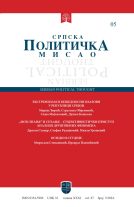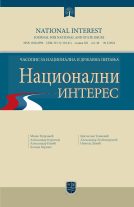- Home page
- Researchers
- Dragan Stanar
Dragan Stanar
Faculty of International Politics and Security, University UNION Nikola Tesla Belgrade

CULTURAL MEMORY AND MILITARY TRADITION
In this article, author aims to offer an in-depth analysis of the place and meaning of cultural memory in the contemporary era of human civilization, observing it from the perspective of the military. By analyzing the phenomenon of cultural memory and cultural trauma, as a necessary element of cultural memory content, author recognizes and lists four key conditions, i.e. criteria that a certain historical trauma must meet in order to constitute cultural trauma. Application of the four conditions to the situation and scenario of soldiers dying in war by the author demonstrates and explains how and why soldiers’ deaths in war cannot in fact constitute cultural trauma, and thus consequently cannot represent the type of suffering and death upon which cultural memory is founded on and upon which collective national identity is built. Author of the paper recognizes the specific role of military tradition as the sole instrument of preservation of memory on soldiers’ sacrifices in war in order to conclude that optimal development, preservation and strengthening of military tradition in all the forms it manifests in constitutes a duty for each and every generation which wishes not only to preserve eternal and dignified memory of those who laid their lives down for their societies and collectives, but also to preserve and maintain the very essence and root of military identity.

SARAJEVO IN THE PROCRUSTEAN BED: “SIEGE” OF A DIVIDED CITY
In this paper author aims to explain how constructed narratives condition the use of certain notions examining the (mis)use of the notion “siege” in the case of Sarajevo during the war in Bosnia and Herzegovina from 1992 to 1995. Conceptual analysis of the notion “siege” enables identification of essential features of this notion, which then in effect determine its logical scope and reach of usage. By analyzing the case of Sarajevo, the author proves that events in this city did not reflect essential features of the notion “siege.” Therefore war-time Sarajevo does not fall in the logical reach of that notion, but rather of a “divided city.” In conclusion, the author explains that mainstream media, academia, and many officials have been insisting on using the notion “siege.” It is the only notion that fits the preconstructed narrative aiming to explain the war in Bosnia and Herzegovina.

“TRESHOLD OF MEANING” AND “CEILING OF FORM” IN THE CONTEMPORARY MILITARY
In this paper author wishes to explore and investigate the relationship between form and meaning in contemporary militaries, aiming to identify the phenomena of form not reaching the threshold of meaning and form which breaks its own ceiling. Relying on methods of conceptual analysis, comparative analysis, content analysis, deduction and other scientific methods, the author identifies the problematic phenomena of form not meeting the threshold of meaning and form which breaks its own ceiling. These are the cases of misunderstanding, or even deliberate ignoring, of the value nature of form, which is always and by definition in the realm of instrumental, and even postulating form as an intrinsic value, a value in itself. When form has no contribution to achieving a goal of intrinsic and “final” value, then it cannot be observed as valuable, and as such it loses its existential justification. Moreover, in cases in which form becomes observed as intrinsic value, i.e., not an instrument and means of achieving some final value, but rather a value in itself, it breaks its own proverbial ceiling. Both these cases are hindering, even detrimental, to achieving the final goal on the basis of which they were even created in the first place. The author first explains why form is of such crucial value for the military, as it is extremely complex and “unnatural,” observing several aspects of the military which demand the existence of strict and robust form in order for the system to properly function. Upon explaining its significance, the author identifies specific articulations of form – previously elaborated phenomena of form aren't reaching the threshold of meaning and for breaking its own ceiling – which are detrimental to the military. The author argues that such articulations of form are not in military systems. At the same time, that they are extremely dangerous and detrimental for optimal functioning of the military. In conclusion of the paper, the author asserts that certain measures must be implemented in military systems. They must evaluate and re-evaluate all existing articulations of form to identify and eliminate those which have no justification for existence. Such evaluation must be undone in an ad hoc fashion, but rather a process of constant evaluation of form must be integrated into the military organization to yield optimal results.

POLITICAL VICTORY IN WAR: ARMED FORCES AND THE SYNDROME OF “VICTORY LOST”
In this paper, author explores the meaning of the notion of victory in war and determines the existence of two different meanings – military and political victory, which can be different from each other. The aim of the paper is to demonstrate the possible long-term practical consequences of potential semantical divergence of these two kinds of victory in war, i.e., of achievement of military victory that contributes nothing to the political victory, despite them being closely interconnected. Given the fact that the nature of war is necessarily political, as Clausewitz determined, the only meaningful victory in war is a political victory, i.e., a victory which attains and fulfills the key political aim of war. Every war has the same final political aim, which is the creation of a better, acceptable and sustainable peace for the victor, different from the peace in which the war started. In cases in which enemies are “only” militarily defeated in war, without reaching full political victory, the phenomenon of “victory lost” occurs - military victory that cannot be capitalized politically in the period of peace/truce that follows after war, and which is usually politically “lost” in this period. In addition, such an “empty” and pyrrhic military victory usually generates a substantial historical burden for the victor-nation, which can represent a significant politico-cultural and historical ballast for decades, if not centuries. All military victories are paid for dearly in human lives and sacrifices, and the inability to politically capitalize them can be crippling for nations as they strive to provide meaning for sacrifices and deaths of their warrior ancestors. Author concludes that it is necessary to raise consciousness, both in the realm of politics and in high military officers, about the necessary political nature and logic of war which must dictate all decisions during armed conflict and which conditions justified use of military force in war. One of the key mechanisms for this is strengthening of social sciences and humanities education within armed forces which would enable officers to develop a deep understanding of not just the nature of war, but also of their institution and its position within the political system and the entire society.

MILITARY AND TERRORISM: AN ALTERNATIVE PERSPECTIVE OF THE JUSTIFICATION OF THE USE OF ARMED FORCES AGAINST TERRORISM
This paper examines the justification of the use of armed forces against terrorism by comparing terrorism to forms of political violence which allow and justify the use of military, such are guerrilla, uprisings, and war. This paper aims to investigate the compatibility of army’s mission and nature with terrorism as a form of political violence, and concludes that they are incompatible, and that a new paradigm of terrorism should exclude the combat use of armed forces. Peacetime use of military must be restricted to non-combat assistance to peacetime security forces and public institutions. By analyzing terrorism’s definition, but also the problems of defining this phenomenon presented by numerous esteemed writers, author aims to demonstrate that this form of political violence is possible exclusively in peace, which is a necessary attribute of terrorist violence. The crucial difference between the very nature of war and peace classifies the same form of violence differently, depending on the state in which it is manifested – war or peace. Therefore, combat use of armed forces must be restricted to the state of war, while in peace it can only be use in accordance with its function of deterrence. By erasing, or even by blurring, the thin line and border between war and peace, which is one of the results of the modern proclaimed “war on terror”, we are enabling the process of pollicization of armed forces and its unlimited use against terrorism in peace. This introduction of armed forces in the criminal arena against criminals is highly problematic in various ways, especially for members of armed forces. Simultaneously, the world is led into an extremely perilous state of quasi-war, in which all those who are labeled as terrorists lose both criminal rights in peace and combatant rights in war at the same time. The current perspective of the use of armed forces against terrorisms has proven not only to be completely ineffective, but also very counterproductive, as it causes more terrorism and more terrorists all across the globe than ever before.

ETHICAL DETERMINANT OF MILITARY MORALE
The term moral is a homonym, and has multiple meanings in Serbian language. Unlike in English, where we have several different terms, referring to several different notions – ethics, moral, morale, there is a conceptual confusion in regards to the use of the word moral, as it can refer to several different meanings. In the military context, the syntagma moral vojske can mean both moral in the military and military morale. It is precisely due to this polysemy of the word moral in Serbian language, especially in the military discourse, that issues arise. One of the most significant implications of this is the reduction of the meaning of moral to only what would be military morale in English – a psycho-emotional state of motivation and spirit. In this way, the “ethical” meaning of the word moral is neglected and even ignored. This paper aims to show how it is impossible to generate and maintain the desired level of military morale without taking into account the ethical element in the military. Moreover, the author of this paper asserts that we must define an “ethical determinant” of military morale. What this actually means is that, when arguing about what impacts military morale, especially in war, we must not forget the impact that immoral behavior of individuals within our ranks has on overall military morale. Immoral behavior of individuals, particularly neglection of the Jus in Bello norms of the Just War Theory, can undermine the resolve, confidence and belief of their units, as believes about justness of war of witnesses of such behavior can be shook to the core. If combatants do not believe that their fight is a righteous and just one, if they start to question the purpose and justness of their side, we can no longer expect the optimal level of morale in this unit. Neglection of ethical norms (the value-meaning of the term moral in Serbian language) in the context of military ethos and military ethics cannot be without impact on military morale. The two notions are not in conflict with each other – on the contrary, they are complementary, and thus they must both remain a part of what we define as military ethics and military ethos. This mutual relation is perfectly sublimed in the process of defining the ethical determinant of military morale. Elimination of the “ethical” meaning of the word moral from military discourse represents a dangerous and reckless reduction witch can have deep and profound negative implications both on military and society.
